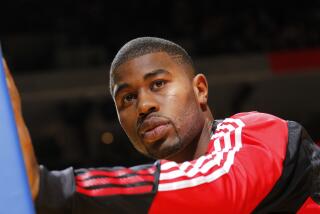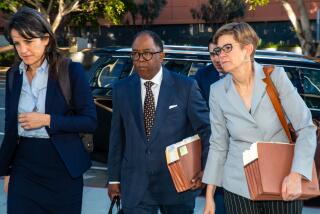D.A. Seeks New Trial for Bribery : Williams May Face Another Jury on Point-Fixing Charge
- Share via
NEW ORLEANS — Prosecutors demanded in an appeal Wednesday that Tulane University’s John (Hot Rod) Williams be tried a second time on charges of sports bribery lest an “obviously guilty defendant . . . walk away scot-free.”
Williams, a 6-10 center, was freed last month after a mistrial in the point-shaving scandal.
At the time, Orleans Parish Judge Alvin Oser said the district attorney’s office had hopelessly botched the case by failing to share important evidence with the defense before the trial began.
In documents filed Wednesday, District Attorney Harry Connick urged the state 4th Circuit Court of Appeal to reject Oser’s “superficial and woefully misleading” ruling and reinstate the charges.
“An obviously guilty defendant will walk away scot-free and we all, as a consequence, suffer in the aftermath,” he said. “The record of this case is devoid of any support for the judge’s rulings.
“In fact, the record exposes the court’s elaborate, but unconvincing, rationale for dismissing this case more for what it distorts and fills in than for what it reflects in terms of reality.”
Williams was one of nine defendants accused of shaving points in two Metro Conference games in return for cocaine and cash. Four have pleaded guilty, and four others remain to be tried--player David Dominique, Tulane student Ken Turkel and two suspected New Orleans bookmakers.
The legal issue in the Williams mistrial was a taped confession from Jon Johnson, a Tulane player granted immunity in return for his testimony against the others. Williams’ lawyers said they had seen a transcript of Johnson’s statement but did not know the tape existed until Johnson mentioned it in the second day of testimony.
After hours of legal wrangling, Williams’ lawyers convinced the judge to grant a mistrial and throw out the charges against Williams.
Oser said prosecutors had deliberately withheld the tape, violating the rule requiring them to turn over any evidence that might help Williams defend himself.
But Connick said Oser never mentioned in his ruling whether Johnson’s statement was exculpatory and subject to the rule.
More to Read
Go beyond the scoreboard
Get the latest on L.A.'s teams in the daily Sports Report newsletter.
You may occasionally receive promotional content from the Los Angeles Times.










